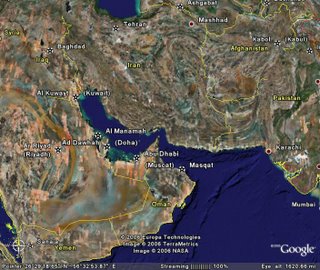The Tehran Calculus
By Charles Krauthammer
Friday, September 15, 2006
In his televised Sept. 11 address, President Bush said that we must not "leave our children to face a Middle East overrun by terrorist states and radical dictators armed with nuclear weapons." There's only one such current candidate: Iran.
The next day, he responded thus (as reported by Rich Lowry and Kate O'Beirne of National Review) to a question on Iran: "It's very important for the American people to see the president try to solve problems diplomatically before resorting to military force."
"Before" implies that the one follows the other. The signal is unmistakable. An aerial attack on Iran's nuclear facilities lies just beyond the horizon of diplomacy. With the crisis advancing and the moment of truth approaching, it is important to begin looking now with unflinching honesty at the military option.
The costs will be terrible:
· Economic . An attack on Iran is likely to send oil prices overnight to $100 or even to $150 a barrel. That will cause a worldwide recession perhaps as deep as the one triggered by the Iranian revolution of 1979.
Iran might suspend its own 2.5 million barrels a day of oil exports and might even be joined by Venezuela's Hugo Chavez, asserting primacy as the world's leading anti-imperialist. But even more effectively, Iran will shock the oil markets by closing the Strait of Hormuz, through which 40 percent of the world's exports flow every day.
Iran could do this by attacking ships in the Strait, scuttling its own ships, laying mines (ed. note: already done in 2005) or just threatening to launch Silkworm anti-ship missiles at any passing tanker. (continue reading)


No comments:
Post a Comment